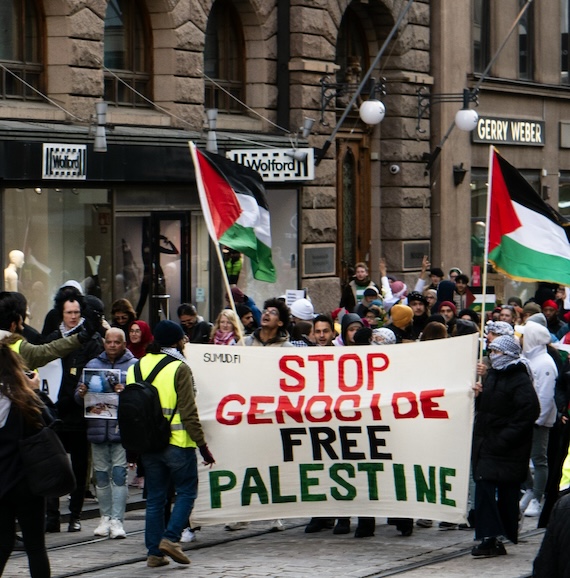( Foreign Policy in Focus ) – Israel’s global standing has deteriorated throughout the war in Gaza, but in recent weeks the decline has been precipitous.
The prohibition on foreign journalists entering the strip hasn’t prevented images of starvation from flooding social media. Doctors’ reports of civilians being used as target practice are making headlines. Bombs continue to rain down on tents.
Now, prominent Israeli scholars, authors, and human rights organizations are concluding, for the first time, that Israel is committing genocide in Gaza.
None of this has been enough to stop the war. Why?
For nearly two years, Israel has claimed that its main war aims are to destroy Hamas and secure the release of hostages. Most Western analysts and media, with some exceptions, have accepted this narrative uncritically. But it was never true.
Destroying Hamas and returning the hostages have each been an objective of the war. Neither has been the primary objective.
Israel’s strategic goal has been ethnic cleansing.
This seemed possible when 6,000 bombs fell on Gaza the first week of the war. It seemed likely when an intel memo arguing Palestinian displacement from Gaza would “yield positive and long-term strategic results” leaked the first month.
In retrospect, it is undeniable.
The extent of devastation, the denial of aid, the systematic targeting of medical facilities, and the state’s willingness to incur massive reputational costs in the United States and internationally only make sense in this light.
Nearly all of Gaza’s schools, hospitals, mosques, universities, heritage sites, even cemeteries, have been erased. Of the tens of thousands confirmed killed, most have been women and children.
Ethnic cleansing is usually carried out quietly, at least until it’s too obvious to deny. But in recent weeks support for the idea within Israel has become loud.
In June, a former member of the Knesset quoted Hitler while advocating for the creation of “Hebrew Gaza.” In July, the heritage minister said the government was racing to “wipe out” the enclave. The same month, the finance minister called it an “inseparable part” of Israel.
Recent polling by Israel Hayom found majority support for reestablishing Israeli settlements. Days later, Prime Minister Netanyahu announced his intention to fully occupy the strip.
All of this raises a question. Why is Gaza so important to Israel? The answer is not Hamas, whose rule Israel supported before fighting broke out. The group has offered to give up power and release all hostages to end the war multiple times.
From Israel’s perspective, Gaza is part of the larger Palestinian problem, which is both territorial and demographic. Because the state defines itself as Jewish, and privileges Jewish people above others, the relative numbers of Jews and Palestinians on land Israel controls matter.
And for Jerusalem, the problem is urgent. By 2022, Israeli demographer Arnon Soffer concluded that Jewish people made up less than 47 percent of those living between the Jordan River and Mediterranean Sea.
Years earlier, he warned demographic pressures would force Israel to kill Palestinians.
This doesn’t sound like liberal democracy, because it’s not. Though all adult citizens in Israel can vote, Palestinian citizens, who make up one-fifth of the population, do not have all the same rights as Jewish Israelis. The same goes for Bedouins, Druze, and Arab Christians.
In the occupied territories, there is no pretense of democracy. Israel is autocratic. Jewish settlers in the West Bank vote and live under civil law. When they commit offenses against Palestinians, 94 percent of cases end without indictment.
Palestinians in the West Bank cannot vote and are subject to military law, where the conviction rate is 95 percent. Their movement is severely restricted through checkpoints, permits, and separation barriers.
These inequalities are a public relations problem, because occupation and apartheid have a bad rap. But when Palestinians disappear, one way or the other, so does discrimination against them.
The story of Israel as a Jewish democracy, with equal rights for all, becomes easier to tell.
People can debate what catalyzed the policy of ethnic cleansing in Gaza. The trauma of October 7, opportunism on the part of far-right politicians, and the prime minister’s political calculations all seem to have played a part.

Photo by Janne Leimola on Unsplash
But policy is what happens at the end of the day. Ethnic cleansing has been a goal of the state. With exceptions, it has been supported by Israeli society.
Will it succeed?
In recent days and weeks, a former Israeli prime minister has condemned Israeli war crimes. Six hundred former Israeli security officials have urged President Trump to help end the war.
France, the UK, and Canada have declared their intention to join 147 other countries in recognizing a Palestinian state. Palestinians continue to do more than anyone to document what’s happening.
If pressure continues to grow, the war could end. Gaza may yet remain Palestinian.
But it is also possible that Israel will rid Gaza of Gazans. In that case, the Palestinian problem would be reduced to a West Bank already subject to decades of demographic engineering.
That is what leaders in Israel want. That is why the war goes on.
Seth Cantey is the Lewis G. John Term Associate Professor of Politics and Head of Middle East and South Asia Studies at Washington and Lee University.


 © 2026 All Rights Reserved
© 2026 All Rights Reserved